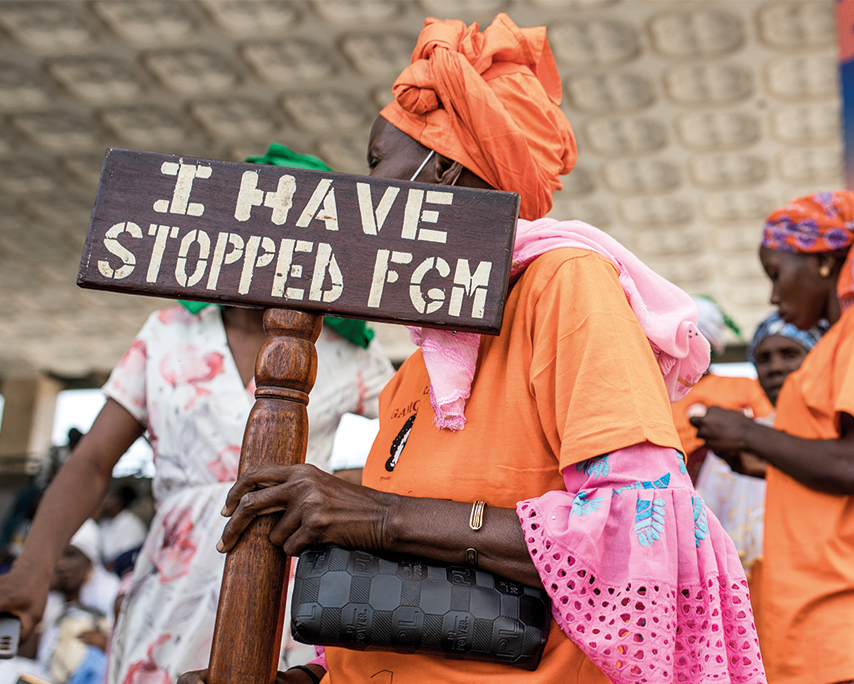The power of repetition in the fight against Female Genital Mutilation
Assessing the effectiveness of messaging in the fight against Female Genital Mutilation (FGM) involves evaluating various interventions aimed at raising awareness, changing attitudes, and ultimately reducing the prevalence of the practice. While comprehensive statistics on the overall effectiveness of campaigns are limited, and while several initiatives have shown positive outcomes, measuring the direct impact of the FGM messaging can be challenging. However, one positive thing to celebrate this year as we commemorate International Day of Zero Tolerance for Female Genital Mutilation is the pivotal role of repetition and consistent messaging through community engagement, policy advocacy, health education, and media campaigns challenging and changing the social norms that perpetuate FGM.
Repetition is a strategic advocacy tool and a fundamental literary device that enhances storytelling. When used effectively, it has been known to reinforce themes, create rhythm, and evoke emotional impact, making a story more memorable and immersive. This is crucial in the fight against FGM, where changing deeply rooted cultural norms requires consistent messaging. Survivors of FGM repeatedly share their stories across multiple platforms, such as books, documentaries, speeches, and interviews, to ensure that the world does not forget their experiences. Their testimonies, told again and again, highlight the severe physical and psychological trauma caused by FGM and create empathy among policymakers, healthcare professionals, and the general public. Most organisations leverage this technique, ensuring survivor voices remain central to the movement.
Since FGM is deeply tied to tradition, changing societal perceptions requires continuous education and alternative narratives. Some communities have successfully replaced the ritual with alternative coming-of-age ceremonies, demonstrating that traditions can evolve while preserving cultural identity. By repeating these new, positive rituals, the harmful practice is gradually phased out.
Health organisations also play a significant role in repeating critical health facts about FGM, such as its risks of infections, childbirth complications, and long-term psychological damage. This persistent messaging counters misinformation and encourages families to abandon the practice. Repetition in reports, videos, and community dialogues reinforces the reality that this practice has no medical benefits, only harm.
In many affected communities, radio programmes, local gatherings, and educational workshops have repeatedly highlighted the dangers of FGM, leading to a gradual shift in attitudes. The Alternative Rites of Passage (ARP) programmes use storytelling and repetition to teach young girls and their families about womanhood without such a harmful rite of passage. Additionally, through continuous storytelling, organisations have created a powerful network of grassroots movements, increasing youth engagement and empowering local activists. Most programmes on the elimination of this practice continuously repeat key statistics and health facts, reinforcing the anti-FGM stance across multiple countries. Such persistent advocacy has helped over 6.8 million people denounce FGM and supported over 3,000 legal cases to protect at-risk girls. Similarly, social media campaigns like #EndFGM amplify survivor voices, educate the public, and keep pressure on governments to enforce anti-FGM laws.
Repetition is effective because it emphasises core messages, making them resonate with audiences. A recurring phrase, symbol, or story reinforces ideas, challenges cultural beliefs, and sustains advocacy momentum. When awareness messages are consistently reinforced in media, education programmes, and public discourse, they become ingrained in societal consciousness, paving the way for lasting change. Accumulatively, repetition can turn awareness into action and action into change. By continuously telling the FGM story through survivour testimonies, media campaigns, community dialogues, and policy advocacy, activists ensure that the movement against FGM remains strong and unwavering.



